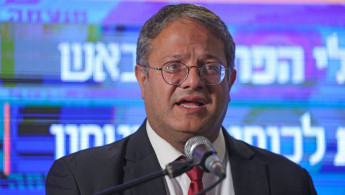Israel's extreme-right minister Ben-Gvir storms Al-Aqsa Mosque compound
Israel's extreme-right security minister Itamar Ben-Gvir "invaded" the Al-Aqsa Mosque compound in occupied East Jerusalem on Tuesday, his spokesman said, enraging Palestinians who see the move as a provocation.
"Our government will not surrender to the threats of Hamas," Ben-Gvir said in a statement published by his spokesman after the Palestinian armed group warned that such a move was a "red line" for the movement.
Ben-Gvir's intrusion at Al-Aqsa comes days after he took office as national security minister in Israel's new far-right government, a position which gives him powers over the police.
Al-Aqsa Mosque is the third-holiest site in Islam and the most-sacred Muslim place in Palestine.
Jews refer to the compound as the Temple Mount and consider it their holiest site, though a significant proportion – particularly from the ultra-Orthodox community – believe praying there violates religious law.
"The Temple Mount is the most important place for the people of Israel, and we maintain the freedom of movement for Muslims and Christians, but Jews will also go up to the mount, and those who make threats must be dealt with – with an iron hand," he said.
Lying within occupied East Jerusalem, which was illegally annexed by Israel in 1980, the compound is administered by the Waqf Islamic affairs council, with Israeli forces operating there and controlling access.
The longstanding status-quo agreement governing the site says only Muslims can pray there while non-Muslims are only allowed to visit. Jordan, the custodian of Al-Aqsa and other Muslim and Christian holy sites in the city, slammed Ben-Gvir's intrusion.
"Jordan condemns in the severest of terms the storming of the Aqsa mosque and violating its sanctity," said a statement by the foreign ministry.
Ben-Gvir has lobbied to overhaul the management of the site to allow Jewish prayer there, a move opposed by mainstream rabbinical authorities.
Waqf guards told AFP that Ben-Gvir was accompanied by units of the Israeli security forces, while a drone hovered above the holy site.
After he left the site on Tuesday morning, visitors arrived at the plaza and the situation remained quiet.
While Ben-Gvir has attended the compound numerous times since entering parliament in April 2021, his presence as a top minister carries far greater weight.
A controversial intrusion in 2000 by then-opposition leader Ariel Sharon was one of the main triggers for the second Palestinian intifada, or uprising, which lasted until 2005.
The Palestinian foreign ministry condemned Ben-Gvir's attendance at Al-Aqsa as an "unprecedented provocation and a serious threat to the arena of conflict".
Basem Naim, a senior Hamas official, last week warned such a step would be "a big red line and it will lead to an explosion".
Following Ben-Gvir's intrusion, Hamas spokesman Hazem Qassem deemed it a "crime" and vowed the site "will remain Palestinian, Arab, Islamic".
Hamas rules the Gaza Strip. In May 2021, Israel launched a brutal 11-day bombing campaign against the besieged enclave, killing more than 250 Palestinians, the vast majority civilians, including children.
It followed rocket fire from Palestinian militants in Gaza that came after Israeli raids at Al-Aqsa. Rockets launched by Hamas and other Palestinian armed groups during the 11 days killed 13 people in Israel.
Hundreds of Palestinians and dozens of Israeli police officers were wounded in the preceding period across East Jerusalem.
Tensions were initially heightened by restrictions on Palestinians gathering and possible expulsions of residents from their homes in favour of settlers.
During this period, Ben-Gvir rallied his supporters at Israeli settler homes in East Jerusalem, an area which has been occupied by Israel since the 1967 Arab-Israeli War.
For years seen as a fringe figure, the Jewish Power party leader entered mainstream politics with the backing of Prime Minister Benjamin Netanyahu.
Ben-Gvir has advocated for Palestinian citizens of Israel deemed disloyal to the state to be expelled and for the annexation of the illegally occupied West Bank.
Until a few years ago he had a portrait in his living room of Baruch Goldstein, a settler who massacred 29 Palestinian worshippers at Hebron's Ibrahimi Mosque in 1994.
He launched his ministerial career on 29 December as part of Israel's most right-wing government in history led by Netanyahu.
(AFP, Reuters, The New Arab)





 Follow the Middle East's top stories in English at The New Arab on Google News
Follow the Middle East's top stories in English at The New Arab on Google News


